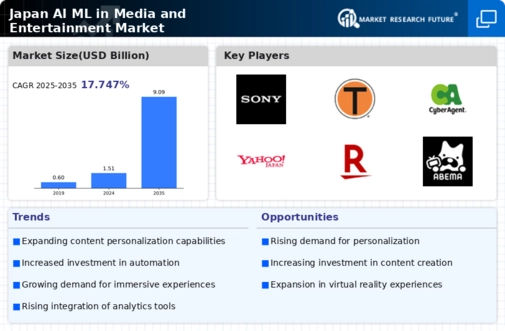Emergence of Smart Devices
The proliferation of smart devices in Japan is reshaping the landscape of the ai ml-in-media-and-entertainment market. With an estimated 80 million smart devices in use, the integration of AI and ML technologies is becoming increasingly vital for content delivery and user interaction. These devices facilitate seamless access to media content, allowing for personalized recommendations and enhanced user experiences. The ability to analyze user data in real-time enables content providers to adapt their offerings dynamically, thereby improving viewer satisfaction. As smart devices continue to gain traction, the demand for AI and ML solutions to optimize content delivery and engagement is expected to grow significantly.
Growth of Interactive Gaming
The interactive gaming sector in Japan is experiencing remarkable growth, which serves as a significant driver for the ai ml-in-media-and-entertainment market. With the gaming industry projected to exceed $20 billion by 2025, the incorporation of AI and ML technologies is essential for enhancing gameplay experiences. These technologies facilitate personalized gaming experiences, adaptive difficulty levels, and intelligent NPC behavior, which are crucial for player engagement. Moreover, AI-driven analytics provide developers with insights into player preferences, enabling them to tailor content effectively. As the gaming landscape evolves, the reliance on AI and ML for innovation and competitiveness is likely to intensify.
Rising Demand for Streaming Services
The increasing demand for streaming services in Japan is a pivotal driver for the ai ml-in-media-and-entertainment market. As consumers shift from traditional media to on-demand content, platforms are leveraging AI and ML technologies to enhance user experience. In 2025, the streaming market in Japan is projected to reach approximately $3 billion, reflecting a growth rate of around 15% annually. This surge necessitates advanced algorithms for content recommendation and user engagement, thereby propelling the adoption of AI and ML solutions. The competition among streaming platforms further intensifies the need for innovative content delivery methods, making AI and ML indispensable in optimizing viewer satisfaction and retention.
Investment in Media Technology Startups
The surge in investment in media technology startups in Japan is a notable driver for the ai ml-in-media-and-entertainment market. Venture capital funding in this sector has seen a substantial increase, with investments reaching over $500 million in 2025. This influx of capital is fostering innovation and the development of cutting-edge AI and ML applications tailored for media and entertainment. Startups are exploring novel ways to enhance content creation, distribution, and audience engagement, which could lead to disruptive changes in the industry. As these technologies mature, they are likely to play a crucial role in shaping the future of media consumption in Japan.
Advancements in Animation and Visual Effects
Japan's rich history in animation and visual storytelling is significantly influenced by advancements in AI and ML technologies. The ai ml-in-media-and-entertainment market is witnessing a transformation as studios adopt these technologies to streamline production processes and enhance visual quality. For instance, AI-driven tools can automate labor-intensive tasks, reducing production time by up to 30%. This efficiency allows creators to focus on storytelling and artistic expression. Furthermore, the integration of AI in visual effects enables the creation of more realistic and immersive experiences, appealing to both domestic and international audiences. As the demand for high-quality animation continues to rise, the role of AI and ML becomes increasingly critical.



















Leave a Comment